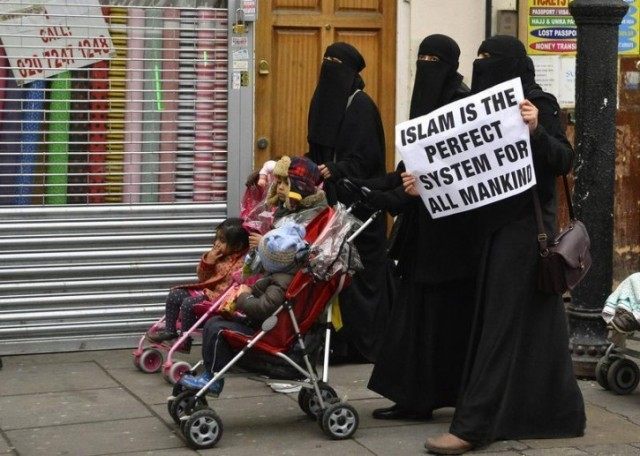The government is planning a crackdown on behaviour which fuels radical Islam in the UK, a leaked Home Office report has revealed. Around 320 “dangerous” jihadis have already returned from fighting abroad but under a new “get tough” strategy, those who seek to radicalise, as well as those who actively fight, will be targeted.
The report calls for a ban radicals working unsupervised with children to prevent them brainwashing youngsters, a crack down on sharia courts, and penalties introduced into the benefits system to ensure that people learn English to better integrate into society, the Telegraph has reported.
Other proposed measures include training staff at jobcentres to identify people vulnerable to radicalisation, and a crackdown on violence against women, including doing more to prevent female genital mutilation and honour killings.
The report has been drawn up by the Home Office, with a foreword by Home Secretary Theresa May. Previously, responsibility for anti-radicalisation measures lay with Eric Pickles’ Department for Communities and Local Government (DCLG), but the portfolio has now been transferred to the Home Office as it was felt that the DCLG was too sympathetic to Islamist Extremists.
Mrs May is already known to take a tougher line on extremism. Last year she promised to “undermine and eliminate extremism in all its forms.” Consequently, the report is not primarily directed at terrorism, or at the 700 British jihadis who have travelled abroad to fight with Islamic groups. Nor does it solely focus its attention on the 320 or so “dangerous” jihadis who have returned to these shores, but instead casts its net wider, at behaviour which, whilst “often legal”, nevertheless undermines social cohesion and causes “very significant damage to our communities”.
That behaviour includes hate preaching; plots such as the “Trojan Horse” takeover of schools in Birmingham where secular leaders were pushed out, whilst pupils were segregated and given lessons in Arabic; and the complicit actions of some local authorities.
“In the past, there has been a risk that the Government sends an ambivalent and dangerous message – that it doesn’t really matter if you don’t believe in democracy,” the report reads.
“We need to stand up and be more assertive in promoting our values and challenging the extremists who fundamentally oppose them. This will include explaining our foreign policy [and] promoting mainstream voices supporting the quiet majority in all communities who oppose extremism.”
It is understood that the report has been delayed for some months amidst arguments over how strongly worded it should be, but the government is planning to release it before the General Election.
Sharia courts come under the microscope within the report, as they represent a “parallel legal system” to the British courts. The government is “concerned about the way Sharia councils are working in some parts of the country” following “troubling reports that in some areas women have suffered from the way these councils work, either through forced marriage or discriminatory divorce proceedings.” The report calls for an “independent review” of the way Sharia courts operate.
Education at all levels is also a focus, thanks to the Trojan Horse schools plot, which the report says was “not an isolated example of schools where extreme views became prevalent… we have seen evidence of extremist ‘entryism’ where extremists have consciously sought to gain positions of influence to better enable them to promote their own values”.
That entryism is also apparent in universities, local authorities and charities, all of which have proved vulnerable to Islamic infiltration. Tower Hamlets council in London was cited by the report as a place where “widespread allegations of extremism, homophobia and anti-Semitism have been allowed to fester without proper challenge” and where the council’s “abuse of taxpayers’ money” and “culture of cronyism” have been reflected in “partisan community politics that was to the detriment of integration and community cohesion”.
As part of tackling extremism on university campuses, the government “will introduce the power to refuse or remove licenses to sponsor visa applications from any institution in the UK which promotes extremist views or knowingly and without challenge hosts extremist speakers”. That provision would seriously affect universities which gain much of their income from foreign students, including Westminster, where Mohammed Emwazi, aka Jihadi John, studied before travelling to Syria.
Tighter rules on the granting of citizenship are also proposed, with applicants having to “prove adherence to British values and active participation in society” before being given leave to stay. Refugees applying for asylum will have to comply with a “carefully defined legal threshold” of opposition to British Values, and those who fail will be granted a “new form of restrictive leave to remain”. Visitors too will have to comply as “British values” will be made “an integral part of applying for a visa”.
The release of the Home Office report is likely to coincide with that of a Downing Street report on the Muslim Brotherhood, which is expected to denounce the group as the “ideological precursor to terrorism”. The report is understood to be so sensitive that only a two page executive summary will be made publicly available.

COMMENTS
Please let us know if you're having issues with commenting.